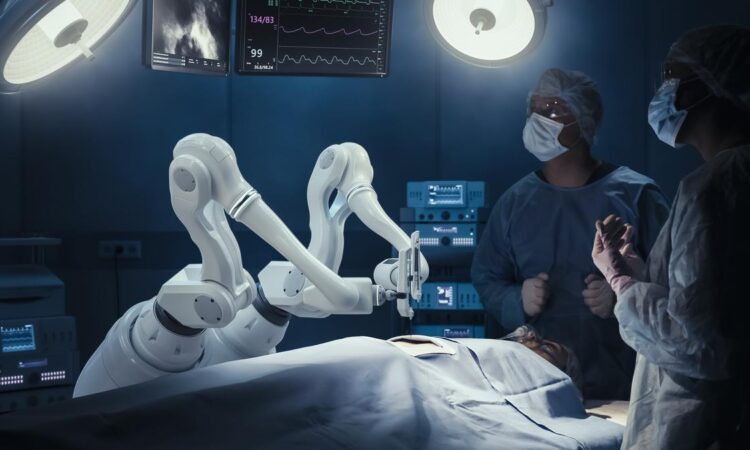
Over the last few years, the partnership between robots and artificial intelligence (AI) has progressed from being fiction to reality, transforming industries’ modus operandi, innovation, and value creation – not replacing humans, but complementing them with unprecedented precision. The global AI-in-robotics market is projected to reach over $80 billion by 2030, underscoring the rapid industrial adoption of intelligent automation.
In its most fundamental aspect, AI makes it possible for robots not only to carry out pre-programmed instructions but to learn, adapt, and make autonomous decisions in ever-evolving situations. Through the integration of human imagination, our ability to innovate, solve problems, and think beyond pattern, with machine precision, we’re creating a new generation of intelligent collaboration.
Precision meets intelligence
The most groundbreaking use, maybe, is in medicine. In robotic surgery, artificially intelligent machines provide surgeons with support to execute minimally invasive procedures with micrometric accuracy, resulting in fewer side effects and faster patient recovery. Surgeons are still responsible for making the major decisions, and robots provide dexterity and precision.
In industry, smart robots are revolutionising assembly lines. They don’t just do repetitive work; they are able to predict machine failures, streamline processes, and modify operations in real-time. Similarly, in supply chains, self-driving mobile robots assist in optimising warehouse logistics, adapting to demand fluctuations with human-like agility. Across India, similar advances are visible in logistics and e-commerce. Several Indian robotics startups are deploying autonomous warehouse systems to optimise fulfilment operations for major retailers.
In farming, AI-led robots are assisting farmers in observing soil conditions, anticipating plant disease, and mechanising harvesting, all at increased efficiency and sustainability. From precision planting to data-led irrigation, these technologies are built to supplement, not substitute, human intelligence. For example, in Telangana’s Saagu Baagu initiative, more than 7,000 farmers have adopted AI-based agritech tools for soil health monitoring and disease prediction, nearly doubling their yields and income. This demonstrates how AI-led robotics can drive sustainable, inclusive growth in India’s agriculture ecosystem.
Reinventing decision-making and efficiency
By leveraging computer vision, reinforcement learning, and natural language processing, robots can now operate seamlessly in human-centric environments. For example, cobots may operate in conjunction with human labour in the manufacturing industry, adapting speed and motion according to live human movements. This not only boosts productivity but also ensures safer working environments.
Future driving emerging trends
Conversational GenAI & Voice First Interfaces: Natural language interfaces are simplifying human-robot communication, bridging technical sophistication with operational ease.
Conversational GenAI and Voice-First Interfaces: Natural language interfaces are making human-robot interaction intuitive, bridging technical sophistication with operational simplicity
Domain-specific LLMs: Industry-specific AI models enable robots to learn and adapt special healthcare, aviation, and defence workflows.
AI Agents & AI Assistants: Intelligent robots are transforming as decision-support partners, able to manage dynamic challenges and deliver real-time solutions.
Composite AI and Lifecycle-Based Approach: Integrating a mix of AI approaches ensures consistent learning, improved problem-solving, and longer deployment.
Sovereign AI & Secure GenAI: Amidst growing concern about data privacy, security and local control are emerging as the standards for AI-robotics adoption. In India, initiatives such as IIT Madras’s IndiCASA dataset and indigenous LLMs like BharatGPT are reinforcing the importance of data sovereignty and context-aware AI, ensuring that generative models are trained, hosted, and governed within the country.
Affordable AI: The democratisation of AI through open platforms and no-code tools is enabling even smaller enterprises to access intelligent automation at scale.
Collaboration, not competition
The wiser the robots, the more important it is for human beings to oversee.
Rather than substituting human capability, robot AI can liberate workers from mechanical or dangerous work to better develop their creative and strategic capabilities.
Clear accountability frameworks, regulatory guardrails, and explainable AI will be required to foster trust. India’s National Strategy for AI (‘AI for All’) is already addressing these areas through emphasis on transparency, skill development, and ethical AI deployment — encouraging safe collaboration between humans and intelligent systems.Just as important is skill-building, enabling individuals to work with confidence alongside intelligent machines. Ethical AI must be governed by transparent frameworks that define accountability, explainability, and consent in automation.
A responsible road to innovation
For businesses worldwide, the convergence of AI and robotics presents a goldmine of opportunities. From operationally optimised efficiency to hyper-personalised customer experience, the future is limitless. Invest in human-led principles, ensuring technology enhances, not replaces human capability. Take on secure AI platforms that protect data. Take on secure AI platforms that protect confidential data.
AI and robotics collaboration is reshaping the way we work, heal, construct, and live. It’s no longer man versus machine but man and machine, working in harmony to bring about a future in which human ingenuity gains its most acute point through the precision of robots.
In this time of inflexion, companies and policy-makers have a generation-defining opportunity to build a world where technology serves humanity. We are also emerging as a key contributor to this transformation with growing investments in AI R&D, robotics startups, and government-backed innovation hubs that are shaping global conversations on responsible automation.
With collaboration founded on ethics, accessibility, and the right application of AI, we can make smart robots not only automatons but actors in progress. As we move forward, it is imperative that innovation remains rooted in ethics, inclusivity, and purpose ensuring that every leap in robotics and AI ultimately serves humanity.
(The author is Founder and CEO of Corover)




